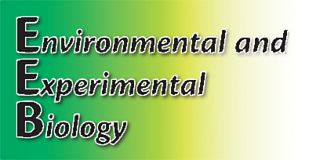
On-line: ISSN 2255–9582

| Faculty of Biology, University of Latvia | ||||||

|
Hard copy: ISSN 1691–8088
On-line: ISSN 2255–9582 Environ Exp Biol (2015) 13: 93–97
|
|||||

|
About the Journal | Retractions | Open Access | Author Guidlines | Current Issue | Archive |
|
Environmental and Experimental Biology |
Environ Exp Biol (2015) 13: 93–97 |
Safflower (Carthamus tinctorius L.) response to foliar spraying of methanol in well-watered and water deficit stress conditions was studied in a split plot experiment with randomized complete block design. Two treatments of full irrigation (control) and interrupted irrigation at flowering stage were compared in main plots and four levels of methanol [0, 10, 20 and 30% (v/v)] in subplots. Results indicated that interrupted irrigation at flowering stage significantly decreased plant height, leaf chlorophyll, seeds number and weight as compared with the control. Interaction effect of irrigation and methanol showed that the highest rate of seed yield under well-watered conditions was obtained at 10% methanol; higher doses of methanol decreased seed yield. Under water stress conditions at flowering stage, seed yield was significantly increased with increasing the methanol dose to 30%, in comparison with 0% methanol or control treatment. This experiment showed that foliar application of methanol in higher doses under drought stress conditions at flowering stage may increase growth and yield of safflower, whereas under fully watered conditions the application of lower doses of methanol may be more effective in yield improvement than use of higher doses.